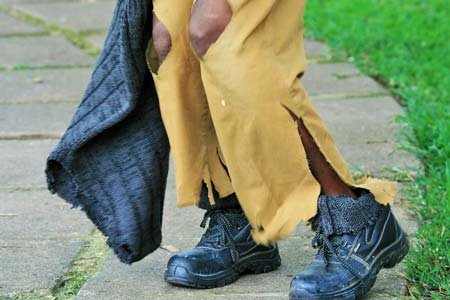 Zechariah 9:9-10
Zechariah 9:9-10
 Romans 8:9, 11-13
Romans 8:9, 11-13
 Matthew 11:25-30
Matthew 11:25-30
Reminiscent of the thought and expression of John's Gospel, today's sublime message from the Gospel of Matthew reveals Jesus' unique relationship as Son to the Father. As Son, Jesus has complete knowledge of the Father and it is in this confidence that He discloses His Father's primary objects of affection – His “favorites”.
Is it permissible that God is partial? Is He not just and fair? Who then are His “favorites” and why? God's preference is made known in ancient Jewish law (Deut 10:18, 24:15, 27:19) and in the prophetic books of the Old Testament (Am 5:7-17, 8:4-14; Mi 2; Is 1:17, 3:14, 5:8, 11:4; Jer 22:16; Zec 7:9-10). God favors the “little ones” (Mt 11:25) – the orphans, the widows, the aliens and the poor – the “powerless” in the lowest strata of the society whom Jesus also praises in the beatitudes (Mt 5:3-6). It is exactly in this respect that God demonstrates His justice and fairness; for these are the anawim (Hebrew word for those who are bowed down) whom, unable to do or obtain anything for themselves, depend totally on God with childlike faith and simplicity.
Jesus the Son is God the Father's anawim. Not only is He poor and stands with the poor (rf 2 Cor 8:9; Lk 6:20-21, 14:12-14; Mt 25:34-40), He even “emptied Himself, taking the form of a slave. . . He humbled Himself, becoming obedient to death, even death on the cross” (Phil 2:7-8). Jesus' kenosis (self emptying) means that He voluntarily deprives Himself to become poor and freely chooses to enter into the “powerless” class of the anawim, making Himself at one with them (CCC 460). Unlike the scribes and the Pharisees who load people with onerous observance of the laws, Jesus issues them a heartwarming invitation and shows solidarity with those burdened by life's struggles and troubles.
It is in this regard that Jesus encourages people to take up “His yoke”. What makes Jesus' yoke easy and His burden light is, as He says, the meekness and humility of the heart (Mt 11:29). Pope Benedict XVI in his General Audience Feb 15, 2006 said: “the spirituality of the biblical anawim, that is, of those faithful who not only recognize themselves as poor in the detachment from all idolatry of riches and power, but also in the profound humility of a heart emptied of the temptation to pride and open to the bursting in of the divine saving grace.”
Though we are not living under the weight of the Mosaic law as the ancient Jews, yet the weight of sins is equally heavy on us. When we willingly become the anawim – in humility, obedience and trust – we will be God's “favorites” and Jesus will stand with us as He did with the anawim in His time. He will provide us with strength and ability to come out from the crushing load of sins. He will lead us to freedom and rest, a new covenantal rest of faith and love where joy and peace will surely far outweigh the weight of the yoke.
